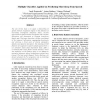Free Online Productivity Tools
i2Speak
i2Symbol
i2OCR
iTex2Img
iWeb2Print
iWeb2Shot
i2Type
iPdf2Split
iPdf2Merge
i2Bopomofo
i2Arabic
i2Style
i2Image
i2PDF
iLatex2Rtf
Sci2ools
103
click to vote
ICPR
2008
IEEE
2008
IEEE
Multiple classifier applied on predicting microsleep from speech
The aim of this study is to apply a state-of-the-art speech emotion recognition engine on the detection of microsleep endangered sleepiness states. Current approaches in speech emotion recognition use low-level descriptors and functionals to compute brute-force feature sets. This paper describes a further enrichment of the temporal information, aggregating functionals and utilizing a broad pool of diverse elementary statistics and spectral descriptors. The resulting 45,088 features were applied to speech samples gained from a car simulator based sleep deprivation study. After a correlation-filter based feature subset selection, which was employed on the feature space in an attempt to maximize relevance, several classification models were trained. The best model (Support Vector Machine, dot kernel) achieved 86.1% recognition rate in predicting microsleep endangered sleepiness stages
Computer Vision | ICPR 2008 | Microsleep Endangered Sleepiness | Speech Emotion Recognition | State-of-the-art Speech Emotion |
Related Content
| Added | 05 Nov 2009 |
| Updated | 05 Nov 2009 |
| Type | Conference |
| Year | 2008 |
| Where | ICPR |
| Authors | Jarek Krajewski, Anton Batliner, Rainer Wieland |
Comments (0)

